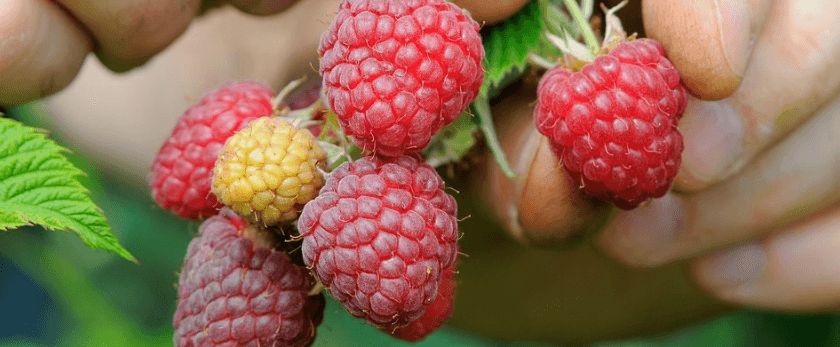Raspberries are a delicious and nutritious addition to any garden. Not only are they packed with vitamins and antioxidants, but they also require minimal maintenance and can be grown in a variety of climates. Whether you're a seasoned gardener or just starting out, here's everything you need to know about growing raspberries.
Choosing the Right Variety
Before you start growing raspberries, it's important to choose the right variety for your climate and growing conditions. There are two main types of raspberries: summer-bearing and ever-bearing.
Summer-bearing raspberries produce one large crop in the summer, while ever-bearing raspberries produce two smaller crops, one in the summer and one in the fall. Depending on your location and preferences, you can choose the variety that suits you best.
Some popular summer-bearing varieties include:
- Heritage
- Tulameen
- Boyne
And some popular ever-bearing varieties include:
- Caroline
- Anne
- Polka
Planting Raspberries
Raspberries can be planted in the spring or fall, depending on your climate. They prefer well-drained soil with a pH between 5.5 and 6.5. If your soil is too acidic, you can add lime to raise the pH.
When planting raspberries, make sure to space them at least 2-3 feet apart to allow for proper air circulation. This will help prevent diseases and promote healthy growth. You can also plant them in rows, with a distance of 8-10 feet between rows.

Caring for Raspberries
Watering
Raspberries require consistent watering, especially during the first year of growth. They need about 1-2 inches of water per week, either from rainfall or manual watering. It's important to water at the base of the plant, rather than from above, to avoid wetting the leaves and causing diseases.
Light
Raspberries thrive in full sun, but they can also tolerate partial shade. If you live in a hot climate, it's best to provide some shade during the hottest part of the day to prevent the plants from getting stressed.
Soil
Raspberries prefer well-drained, fertile soil. If your soil is heavy or clay-like, you can add compost or organic matter to improve drainage and provide nutrients for the plants. It's also a good idea to mulch around the plants to help retain moisture and suppress weeds.
Fertilizer
Raspberries don't require a lot of fertilizer, but it's important to provide them with some nutrients to promote healthy growth. You can use a balanced fertilizer, such as a 10-10-10, in the spring before new growth appears. Avoid fertilizing after mid-summer, as this can encourage new growth that may not have enough time to harden off before winter.
Pruning
Pruning is an essential part of caring for raspberries. It helps promote new growth, increase fruit production, and prevent diseases. Here are some tips for pruning raspberries:
- For summer-bearing raspberries, prune the canes that have produced fruit to the ground after harvest. This will make room for new canes to grow and produce fruit next year.
- For ever-bearing raspberries, prune the canes that have produced fruit to the ground in the fall. This will allow the new canes to produce fruit in the following summer.
- Prune out any damaged or diseased canes at any time of the year.
- It's also important to thin out the canes to allow for proper air circulation and prevent overcrowding.
Best Time to Grow Raspberries
The best time to grow raspberries depends on your location and the variety you choose. In general, raspberries can be planted in the spring or fall, but it's important to avoid extreme temperatures. If you live in a colder climate, it's best to plant in the spring to allow the plants to establish before winter. If you live in a warmer climate, fall planting may be more suitable.
Common Problems with Raspberries
While raspberries are relatively easy to grow, they can still face some common problems. Here are a few to watch out for:
- Diseases: Raspberries can be susceptible to diseases such as anthracnose, powdery mildew, and root rot. To prevent these diseases, make sure to provide proper air circulation, avoid overhead watering, and remove any diseased canes.
- Pests: Some common pests that can affect raspberries include aphids, spider mites, and raspberry fruitworms. You can use natural methods such as introducing beneficial insects or using neem oil to control these pests.
- Birds: Birds love raspberries just as much as we do. To protect your crop, you can use netting or scare tactics such as reflective tape or fake predators.
Responsible Disposal Methods
When it comes to disposing of raspberry canes, it's important to do so responsibly to prevent the spread of diseases. Here are some tips for responsible disposal:
- Burn the canes: Burning the canes is the most effective way to prevent the spread of diseases. However, this may not be feasible for everyone.
- Compost the canes: If you have a hot compost pile, you can add the canes to it. The high temperatures will kill any diseases.
- Bury the canes: If you have a large garden, you can bury the canes in a designated area. Make sure to bury them deep enough to prevent any diseases from spreading.
- Dispose of in the trash: If none of the above options are available to you, you can dispose of the canes in the trash. However, make sure to wrap them in a plastic bag to prevent any diseases from spreading.
Conclusion
Growing raspberries is a rewarding and enjoyable experience. With the right care and maintenance, you can enjoy a bountiful harvest of these delicious berries. Remember to choose the right variety for your climate, provide proper care, and dispose of the canes responsibly. Happy growing!










